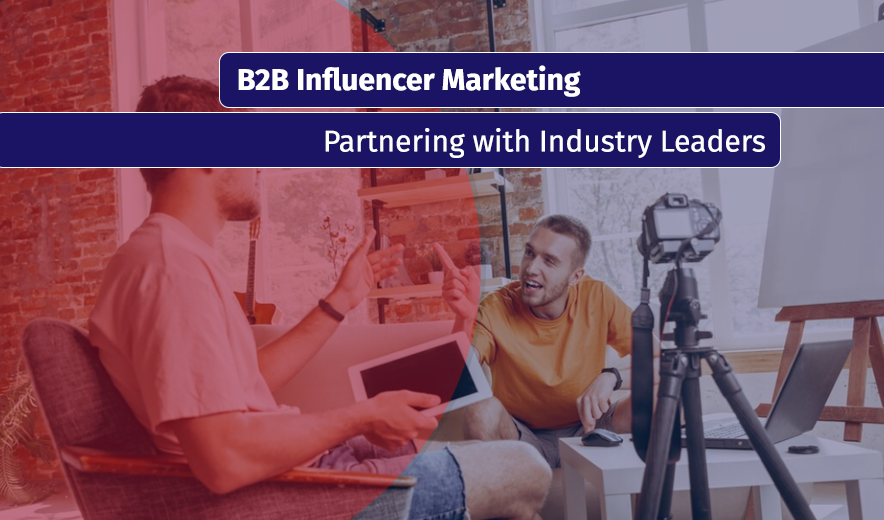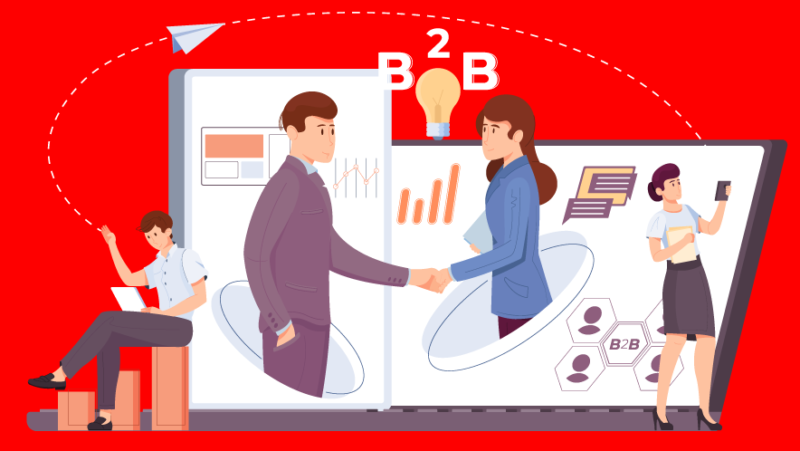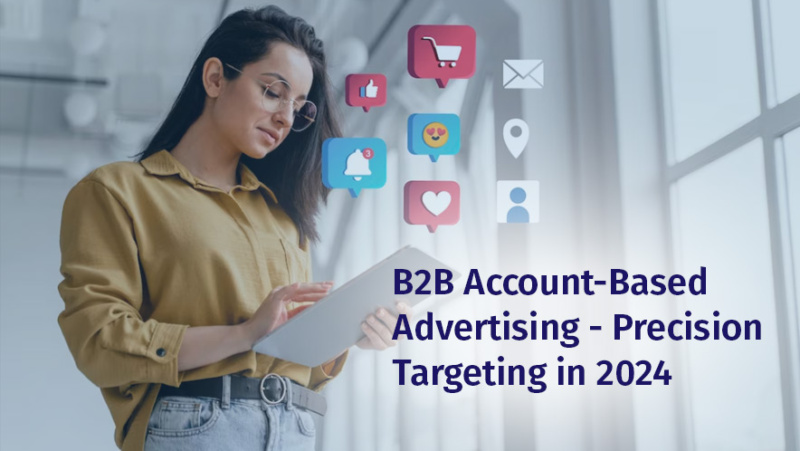The role of influencer marketing is emerging as a pivotal strategy, transcending its traditional association with B2C brands. While B2B transactions are often rooted in logic and expertise, the power of influencers in this space should not be underestimated.
We delve into the nuanced value that influencer marketing brings to B2B, exploring how it cultivates trust, amplifies brand reach, and fosters meaningful connections within industry niches. Beyond the conventional realms of consumer-focused influence, we uncover the unique ways in which B2B influencers contribute to building credibility, driving engagement, and ultimately shaping the narrative of success for businesses in the B2B sector.
B2B Influencer Marketing
B2B influencer marketing is a strategic approach where businesses collaborate with influential individuals within their industry or niche to promote their products or services. Unlike traditional consumer-focused influencer marketing, which targets end consumers, B2B influencer marketing focuses on engaging and influencing other businesses, professionals, or decision-makers.
In this context, influencers are individuals who have established credibility, expertise, and a significant following within a specific B2B sector. These influencers could be industry thought leaders, experts, consultants, or professionals who have built a reputation for their knowledge and insights.
The primary objectives of B2B influencer marketing include:
Building Trust and Credibility: By associating with reputable influencers, B2B brands aim to enhance their credibility and build trust within their target industry.
Amplifying Brand Awareness: Influencers help increase the visibility of B2B brands by leveraging their existing audience and networks. This exposure is valuable for reaching a wider and more targeted B2B audience.
Generating Quality Leads: B2B influencers can contribute to lead generation efforts by endorsing products or services to their engaged and relevant audience, potentially converting them into qualified leads.
Providing Thought Leadership: Collaborating with influencers allows B2B brands to tap into the expertise and thought leadership of influencers, positioning themselves as industry leaders and staying at the forefront of key conversations.
Fostering Industry Relationships: B2B influencer marketing often involves building long-term relationships with influencers. These relationships can extend beyond individual campaigns, leading to ongoing collaborations, partnerships, and networking opportunities.
The success of B2B influencer marketing lies in carefully selecting influencers who align with the brand’s values, target audience, and industry niche. Campaigns should focus on delivering authentic and valuable content that resonates with the specific challenges and interests of the B2B audience. By leveraging the trust and authority of influencers, B2B brands can create meaningful connections and drive business growth in a competitive market.
Identifying and Engaging Influencers
The quest for influential voices to amplify your brand necessitates a strategic and data-driven approach. Let’s delve into the methodologies for pinpointing and connecting with B2B influencers, along with crucial criteria for assessing their impact on your brand.
Data-Driven Methods for Finding Influencers
1. Social Listening Tools
Leverage social listening tools to monitor industry conversations. Identify key players who consistently contribute to discussions relevant to your business. These tools can provide insights into an influencer’s reach, engagement, and the sentiment surrounding their content.
2. Content Analysis
Analyze industry-related content to identify thought leaders. Look for individuals producing high-quality, informative content that resonates with your target audience. Track content performance metrics to gauge influence and relevance.
3. Audience Analysis
Dive into the demographics and interests of potential influencers’ followers. Ensure alignment between their audience and your target market. Tools like audience analytics platforms can unveil valuable information about the composition of an influencer’s follower base.
4. SEO and Online Presence
Explore search engine optimization (SEO) to identify influencers with a strong online presence. Those who consistently appear in search results for relevant industry keywords are likely to have a significant impact. Evaluate the quality and relevance of their online footprint.
5. Partnership Platforms
Utilize influencer marketing platforms specifically designed for B2B collaborations. These platforms often provide detailed profiles of influencers, including their expertise, reach, and previous partnerships. This streamlines the identification process and facilitates smoother connections.
Criteria for Evaluating Influencers
1. Relevance to Industry
The influencer should have expertise in your industry or niche. Assess the alignment between their content focus and the products or services your B2B brand offers.
2. Authenticity and Credibility
Look for influencers who authentically engage with their audience and maintain credibility in their niche. Genuine thought leadership and a trustworthy image are essential for successful B2B collaborations.
3. Engagement Metrics
Analyze engagement metrics such as likes, shares, comments, and click-through rates. A high follower count alone may not indicate influence; genuine engagement is a more reliable measure of impact.
4. Consistency and Frequency
Evaluate the consistency and frequency of an influencer’s content creation. Regular, dependable output contributes to sustained engagement and a more impactful partnership.
5. Network and Connections
Assess the influencer’s network and connections within your industry. A well-connected influencer can extend the reach of your brand and open doors to valuable collaborations.
Combining these data-driven identification methods with a thorough evaluation of influencers based on relevant criteria ensures a strategic and impactful approach. By aligning with influencers who genuinely resonate with your brand and audience, you can forge authentic connections that drive meaningful results in the B2B sphere.
Measuring Influencer Impact
Understanding the impact of campaigns is crucial for refining strategies and demonstrating return on investment (ROI). To gauge the effectiveness of influencer marketing in B2B, it’s essential to focus on specific metrics and key performance indicators (KPIs). Additionally, industry benchmarks provide context for evaluating campaign success. Let’s delve into the metrics and benchmarks that illuminate the impact of B2B influencer marketing.
Metrics and KPIs for Influencer Marketing Effectiveness
1. Engagement Metrics
Likes, Comments, Shares: Measure the volume and sentiment of audience interactions with influencer content. Increased engagement indicates a more active and interested audience.
2. Reach and Impressions
Follower Growth: Assess the increase in the influencer’s follower count over the campaign period.
Impressions: Track the total number of views or impressions generated by influencer content across platforms.
3. Click-Through Rate (CTR)
Link Clicks: Measure the number of clicks on links shared by influencers. A higher click-through rate (CTR) indicates effective content and audience interest.
4. Conversion Metrics
Lead Generation: Track the number of leads generated through influencer-driven campaigns.
Conversion Rate: Calculate the percentage of leads that convert into customers attributed to the influencer campaign.
5. Brand Mentions and Sentiment
Brand Mentions: Monitor the frequency and context of mentions of your brand associated with influencer content.
Sentiment Analysis: Evaluate the overall sentiment of conversations sparked by the influencer campaign.
6. Content Performance
Content Downloads: For campaigns involving downloadable content, assess the number of downloads facilitated by the influencer.
View Duration: Measure how long audiences engage with influencer-generated content, indicating content quality and relevance.
7. Influencer-Specific Metrics
Influencer Reach and Engagement Rates: Evaluate an influencer’s performance in terms of reach and engagement.
Authenticity Score: Assess the perceived authenticity and credibility of the influencer’s endorsement.
Industry Benchmarks for B2B Influencer Marketing
1. Engagement Rates
Instagram: Average engagement rates typically range from 1.5% to 3%.
LinkedIn: Engagement rates can vary but generally fall between 0.5% and 2%.
2. Follower Growth
LinkedIn: A healthy monthly follower growth rate is around 2%.
Twitter: Monthly follower growth rates of 1-3% are considered solid.
3. Conversion Rates
B2B Industry Average: Conversion rates from B2B influencer campaigns often range from 1% to 5%.
4. Content Performance
Downloads: Benchmark success by comparing download rates to industry averages.
View Duration: Aim for an average view duration that exceeds platform norms.
5. Influencer Rates
Cost per Engagement (CPE): B2B influencer CPE can vary but is often between $0.10 and $0.30.
Cost per Thousand Impressions (CPM): B2B CPM rates may range from $10 to $50.
By aligning campaign goals with these metrics and benchmarks, B2B marketers can effectively measure the impact of influencer marketing initiatives, refine strategies, and demonstrate the tangible value of influencer collaborations to key stakeholders.
B2B influencer marketing emerges as a dynamic and impactful strategy, transcending its traditional B2C roots. The unique value it brings to the B2B sector lies in cultivating trust, amplifying brand reach, and fostering meaningful connections within industry niches. By collaborating with influencers who possess credibility and expertise, B2B brands can achieve diverse objectives, including building trust, generating leads, and establishing thought leadership.
The process of identifying and engaging influencers is a strategic journey, involving data-driven methods such as social listening, content analysis, audience evaluation, and leveraging partnership platforms. The careful evaluation of influencers based on relevance, authenticity, engagement metrics, consistency, and network connections ensures a strategic and impactful approach.
Measuring the impact of B2B influencer marketing is crucial for refining strategies and demonstrating ROI. By focusing on specific metrics and KPIs, such as engagement, reach, conversion rates, and content performance, marketers can effectively assess campaign success. Industry benchmarks provide valuable context for evaluating performance against established standards, allowing B2B marketers to showcase the tangible value of influencer collaborations.
In essence, B2B influencer marketing is not just a trend but a strategic imperative for businesses looking to thrive in a competitive landscape. As the influence of these partnerships continues to shape the narrative of success in the B2B sector, embracing this dynamic strategy is a powerful step towards sustainable growth and meaningful connections within the industry.
Be a part of our community for free and access the best resources, trends, and new technologies from peers and industry experts. You can also check out our other awesome blogs over here.





